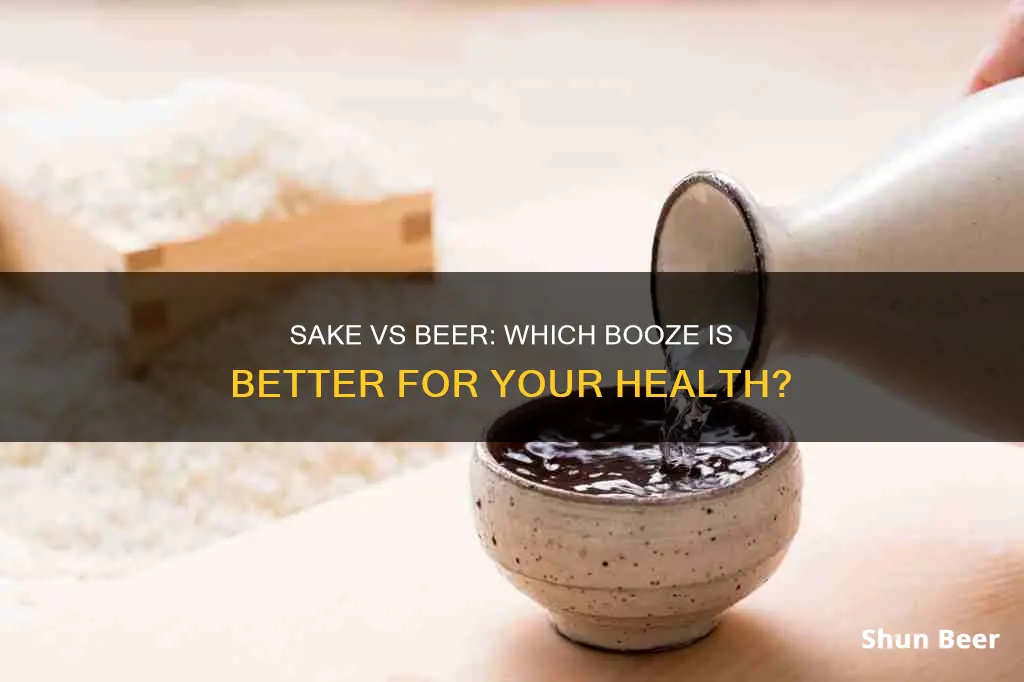
When it comes to health, sake and beer have some similarities and differences. Both are fermented alcoholic drinks, but sake is made from rice, while beer is usually made from barley. In terms of calories, sake is higher than wine but lower than beer, with an average of 187 calories per serving. Sake also has fewer carbs than beer, but it's important to remember that excessive consumption of any alcoholic drink can lead to weight gain and other health issues.
Sake has been associated with several potential health benefits, including reduced cancer risk, improved sleep quality, and skin moisturization. However, it's important to note that most of these studies have been conducted on sake yeast, a non-alcoholic supplement, rather than the alcoholic beverage itself. On the other hand, beer, in moderate consumption, is known to have positive effects on cardiovascular health and a reduced risk of diabetes.
| Characteristics | Values |
|---|---|
| Calories | Sake has 187 calories on average, which is higher than wine but lower than beer. |
| Carbohydrates | Sake has 7.5g of carbohydrates, which is higher than wine but lower than beer. |
| Cancer Risk | A 17-year cohort survey of 265,000 Japanese men found that daily sake drinkers had a lower cancer risk than non-sake drinkers. |
| Osteoporosis | Amino acids in sake help recover and build skeletal muscle, preventing osteoporosis. |
| Cardiac and Cerebrovascular Disease | Moderate drinking of sake can help prevent cardiac and cerebrovascular diseases by preventing blood clots and reducing cholesterol. |
| High Blood Pressure | Sake contains peptides that inhibit the enzymes that cause high blood pressure. |
| Alzheimer's Disease | Sake contains peptides that help prevent Alzheimer's disease and vascular dementia. |
| Moisturizing | Sake contains more moisturizing elements such as glycerol and amino acids than other alcoholic beverages. |
| Rough Skin | Sake has been used as a skin toner in Japan for centuries and can help prevent rough skin. |
| Allergies | Drinking sake or applying it to the body may help prevent allergies. |
What You'll Learn

Sake has fewer calories than beer
Sake, on the other hand, has a higher alcohol content than beer, typically ranging from 15% to 16% ABV. Despite this, sake has fewer calories than beer. According to the USDA, 100 grams of Japanese sake contains 134 calories, with 5 grams of carbohydrates, 0 grams of fat, 0.5 grams of protein, and 0 grams of sugar. The number of calories in sake can vary depending on the type and sweetness, with sweeter sakes having more calories from sugar.
When comparing the calorie content of sake and beer, it is important to consider the serving size. A typical serving of sake is 100 grams, while a standard beer serving is 12 ounces or 355 milliliters. Therefore, when comparing the calorie content of sake and beer, it is necessary to consider the number of calories per gram or milliliter.
In conclusion, sake has fewer calories than beer, especially when considering the typical serving sizes for each beverage. However, it is important to note that the calorie content of alcoholic beverages can vary depending on various factors, such as alcohol content, carbohydrate content, and serving size. Therefore, when making comparisons, it is essential to consider the specific characteristics of each drink.
Beer Drinkers: Healthy or Harmful?
You may want to see also

Sake has more carbohydrates than beer
Sake, also known as Japanese rice wine, is produced in a manner more similar to the process of making beer than wine production. Starch from rice is converted into sugars, which then ferment into alcohol. Sake has a unique flavour and is regarded as a speciality in the gastronomic industry.
Despite the name, sake is not exactly like wine when it comes to carbohydrate content. Sake (1 fl oz) contains 1.5g of carbohydrates, while a standard 12-ounce serving of beer contains around 6.6 grams of carbohydrates on the lower end and up to 14 grams on the higher end. A 6-ounce pour of sake delivers nearly 9 grams of carbohydrates, which is still less than some beers.
Beer is made by fermenting grains such as barley and wheat, which naturally contain carbohydrates. Most beers also contain added sugars, further increasing the carbohydrate levels. The specific number of grains and added sugars in beer can vary depending on the fermentation process and the type of beer.
While sake does contain some carbohydrates, it is important to note that the process it undergoes during production lowers its sugar and carb content. This makes sake a beverage that can be included in a keto diet.
In conclusion, sake has more carbohydrates per ounce than beer, but because the standard serving size for beer is typically 12 ounces, the total carbohydrate intake from a typical serving of beer is higher than that of sake.
Rum and Coke vs Beer: Which Drink is Healthier?
You may want to see also

Sake has a higher alcohol content than beer
Sake's high alcohol content can be attributed to its unique multiple parallel fermentation process, where starch from rice is converted into sugars, and then fermented into alcohol. This is different from the process of making beer, where these conversions occur in two distinct steps.
The high alcohol content of sake is also due to the fact that it is brewed to approximately 20% alcohol content and then diluted with water to lower the alcohol percentage to around 15% to 16% before bottling. This dilution step is not typically done with beer.
It is important to note that the effects of alcohol can be felt differently between sake and beer. Sake is traditionally consumed in small cups called "ochoco," similar to shot glasses, while beer is often swigged from larger pint glasses or pitchers. Therefore, despite the higher alcohol content in sake, the amount consumed per serving may be smaller compared to beer.
Additionally, it is worth mentioning that the serving size and drinking culture can also impact the overall alcohol consumption. In Japan, sake is often served with special ceremonies and rituals, and it is recommended to drink it slowly and savour the flavour. On the other hand, beer is commonly consumed in larger quantities, especially in social settings.
While sake has a higher alcohol content than beer, it is important to consider the serving size and cultural context when comparing the two beverages.
Dos Equis Beer: Healthy Choice or Marketing Hype?
You may want to see also

Sake has a lower sugar content than beer
Sake, also known as Japanese rice wine, is produced in a manner similar to the process of making beer. Starch from rice is converted into sugars, which then ferment into alcohol. However, it is important to note that the sugar content in sake is different from that of beer.
Beer typically has little to no sugar, with most of it being fermented during the brewing process. The sugar content in beer varies depending on the style, such as ales, lagers, and stouts, due to differences in yeast activity, brewing temperatures, and ingredients used. Regular beer usually contains around 10.6 grams of carbohydrates with minimal sugar, as most of it is fermented. Light beer has lower sugar content, with about 3.2 grams of carbohydrates and virtually no sugar.
On the other hand, sake has a higher sugar content than beer. According to the Japan Sake and Shochu Makers Association and the National Research Institute of Brewing, the average sake consists of 4 grams of sugar per 100 grams of sake. This is equivalent to about one teaspoon of sugar. While the sugar content can vary depending on the specific bottle of sake, it typically falls within the range of 0.5 to 4.2 grams per 100 milliliters.
It is worth noting that the American Heart Association recommends no more than 9 teaspoons (36 grams) of sugar per day for men and no more than 6 teaspoons (25 grams) of sugar per day for women. Therefore, while sake does have a higher sugar content than beer, it can still be enjoyed in moderation as part of a healthy diet.
Partake Beer: Healthy Choice or Marketing Gimmick?
You may want to see also

Sake has more health benefits than beer
Sake, also known as Japanese rice wine, has been brewed in Japan for centuries and has gained global popularity in recent years. While both sake and beer contain alcohol, which has some health benefits when consumed in moderation, sake may offer additional health benefits due to its unique production process and nutritional composition.
Lower Calories and Carbohydrates
When consumed in moderate quantities, sake may be less likely to contribute to weight gain compared to other alcoholic beverages. A 100-gram serving of sake contains approximately 105 calories, which is higher than the same amount of beer but lower than that of whisky. Additionally, sake has lower carbohydrate content than beer, with 7.5 grams of carbohydrates per serving compared to 11 grams in beer.
Reduced Cancer Risk
According to a 17-year cohort survey of 265,000 Japanese men by the National Cancer Center in Japan, daily sake drinkers had a lower risk of cancer compared to non-sake drinkers. The amino acids in sake are believed to play a role in atrophying and annihilating cancer cells. Additionally, some elements in sake have been found to inhibit the proliferation of bladder, prostate, and uterine cancer cells.
Improved Skin Health
Sake contains higher levels of moisturizing elements such as glycerol, glycerine, and amino acids compared to other alcoholic drinks. These substances are often used in cosmetics and have been linked to improved skin hydration and heat retention when added to baths. Additionally, sake has been used as a skin toner in Japan for centuries and is believed to help prevent rough skin due to its high content of saccharides and amino acids.
Preventing Osteoporosis
The amino acids in sake, such as valine, leucine, and isoleucine, are essential for skeletal muscle recovery and growth, which may help prevent osteoporosis. Additionally, koji, one of the main ingredients in sake, contains cathepsin-L inhibitors that also contribute to the prevention of osteoporosis.
Lower Risk of Diabetes
Moderate consumption of sake may help reduce the risk of diabetes. Sake contains peptides that inhibit the enzymes responsible for high blood sugar levels, which are a risk factor for diabetes. Additionally, sake has been found to contain an insulin-like activator, which may help address insulin shortages that lead to the development of diabetes.
Preventing Alzheimer's Disease
Sake contains peptides that inhibit PEP, a key factor in the development of Alzheimer's disease and vascular dementia. These peptides may help reduce the risk or slow the progression of these neurodegenerative conditions.
In conclusion, while both sake and beer have their own unique characteristics and appeal, sake may offer a wider range of health benefits when consumed in moderation. However, it is important to remember that excessive consumption of any alcoholic beverage can lead to negative health consequences.
Draught Beer: Healthy Beverage or Just a Fad?
You may want to see also
Frequently asked questions
It depends on how much you drink. Sake has been found to have a lower mortality rate from cirrhosis and lung cancer than other alcoholic beverages such as beer. However, drinking any type of alcohol is not without risk. Sake has a higher calorie count than beer, but you tend to drink less of it.
Sake may contain a lactic acid bacteria called lactobacillus, a probiotic that can help with digestive problems. It can also help prevent osteoporosis, cardiac disease, and high blood pressure.
Drinking any type of alcohol is not recommended for those under the legal drinking age, trying to conceive, pregnant, or depressed. It can also cause complications with pregnancy, medication interactions, and an increased risk of certain cancers.
Moderate drinking is considered one drink per day for women and one to two drinks per day for men. Excessive consumption of any type of alcohol can lead to health risks such as heart damage, alcohol withdrawal syndrome, and short-term alcohol poisoning.







